Top 8 Kubernetes Alternatives & Competitors
Kubernetes has revolutionized the way we handle container orchestration, streamlining the deployment, scaling, and management of applications. But it's not a one-size-fits-all solution. In the diverse world of software development, different needs and environments call for different approaches. That's where Kubernetes alternatives come in, offering varying features and capabilities to suit specific requirements. This article will look into these alternatives, exploring managed Kubernetes services, Container as a Service (CaaS), and Platform as a Service (PaaS) options, each catering to different aspects of container management.

Morgan Perry
December 12, 2023 · 9 min read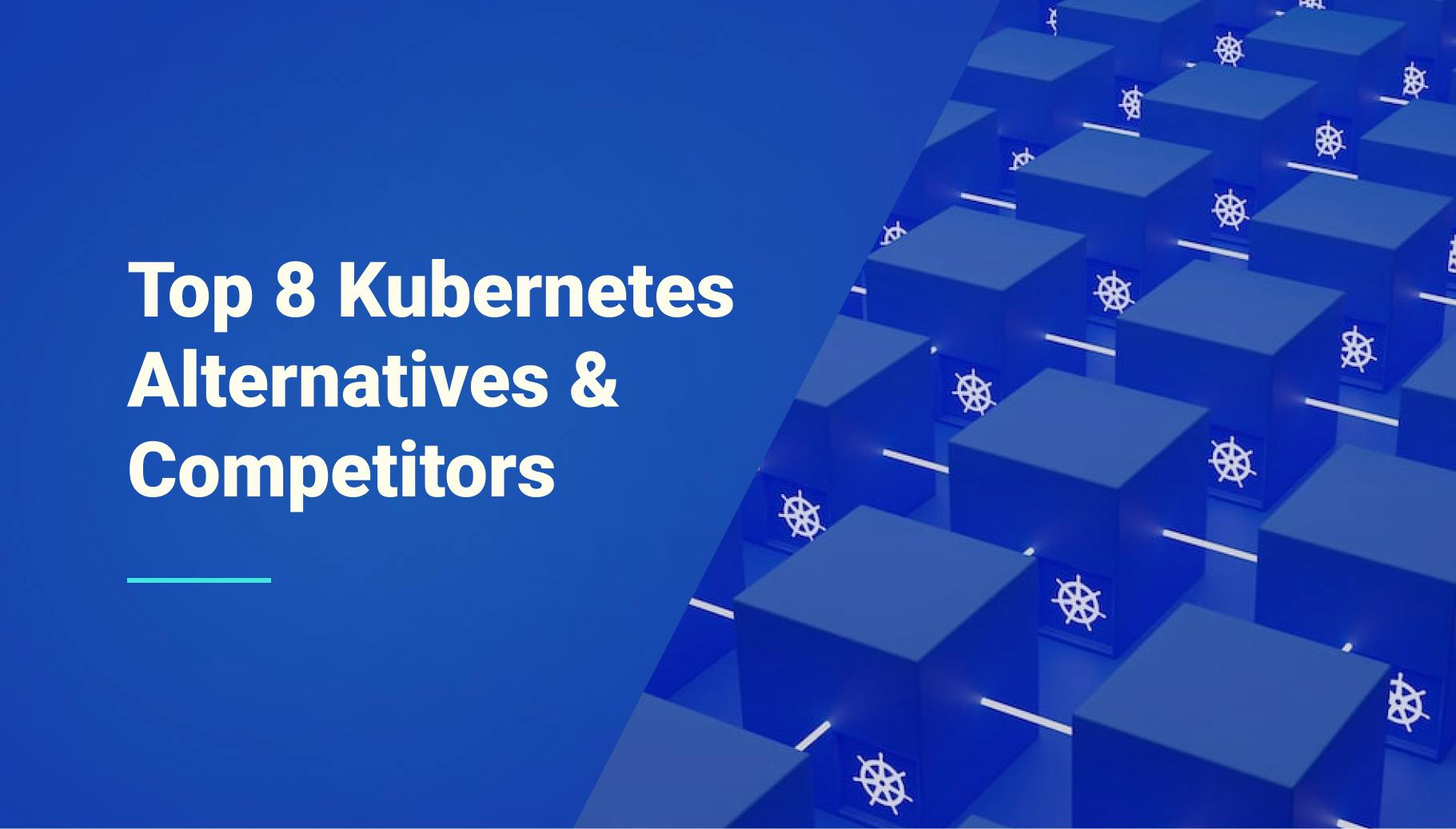
#Kubernetes Alternatives: Categories and Key Players
#A. Managed Kubernetes
Managed Kubernetes services streamline the process of using Kubernetes. These services take care of the setup and ongoing maintenance of Kubernetes clusters, offering scalability, high availability, and automated updates. With integrated tools for monitoring, logging, and security, they reduce the need for specialized in-house expertise, making Kubernetes accessible to businesses of all sizes. Providers like Amazon EKS, Google GKE, and Microsoft AKS offer these managed services, which are adaptable to various cloud environments, including public, private, and hybrid clouds. They are particularly beneficial for organizations looking to leverage Kubernetes' capabilities without the complexity of managing it themselves. Let’s look at some of these key players in this category.
#1. EKS (Amazon Elastic Kubernetes Service)
Amazon EKS is Amazon Web Services (AWS) fully managed Kubernetes service. It automates key tasks such as patching, node provisioning, and updates. EKS is deeply integrated with AWS services like Elastic Load Balancing, IAM, and Amazon VPC, making it a robust choice for AWS-centric organizations.
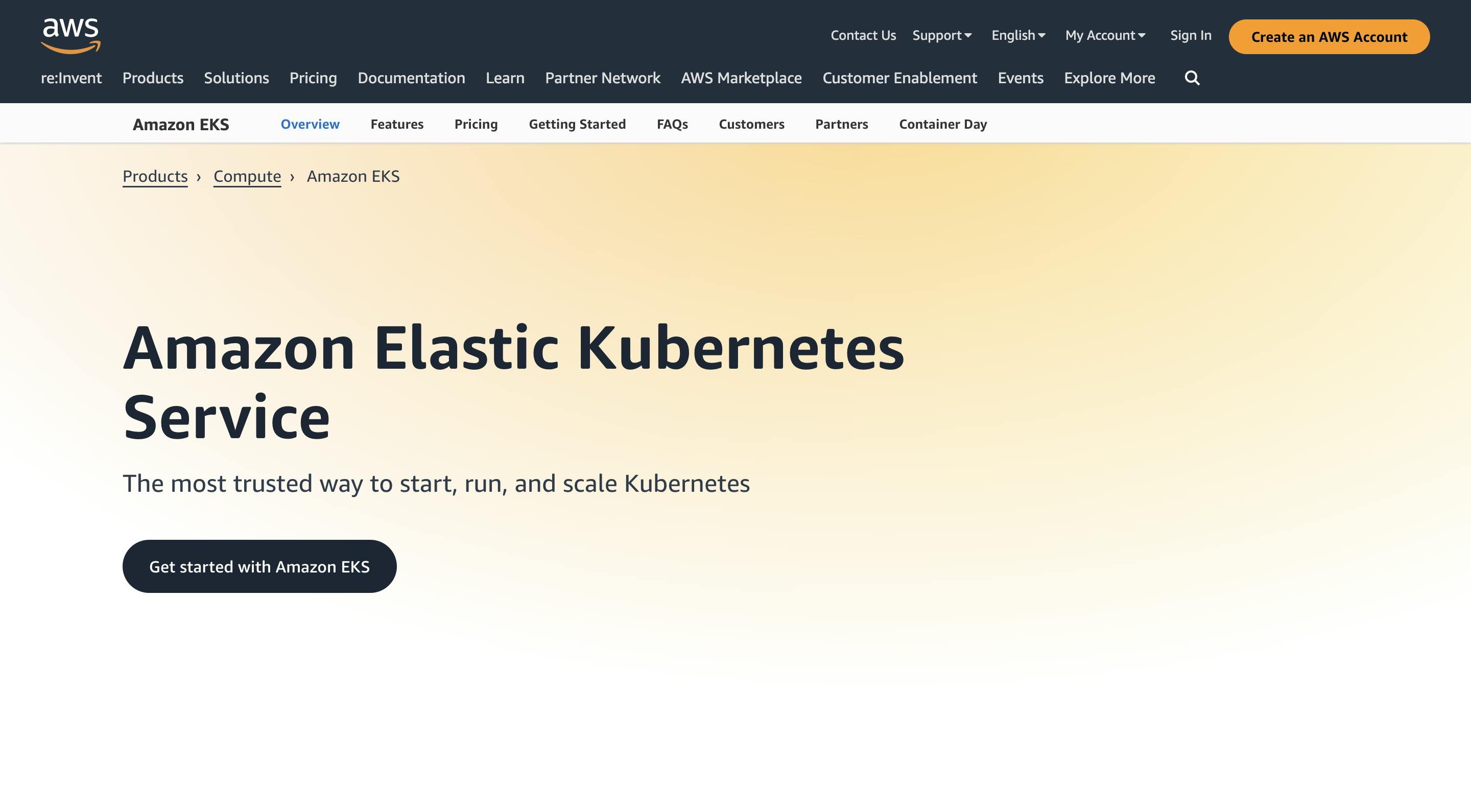
Pros:
- Scalability: EKS supports horizontal scaling, allowing applications to handle increased load seamlessly.
- AWS Integration: Seamless integration with a wide range of AWS services enhances functionality and ease of use.
- Security: Offers robust security features, including IAM for fine-grained access control.
Cons:
- Cost Structure: Understanding and managing costs can be challenging due to AWS's complex pricing model.
- Complexity for Beginners: The steep learning curve for those new to AWS or Kubernetes.
Best suited for:
- Ideal for businesses heavily invested in AWS looking to leverage existing AWS services and infrastructure for Kubernetes. It is particularly well-suited for large-scale enterprise applications requiring extensive scalability and integration with AWS-specific tools and services.
Recent advancements:
- Automated and non-disruptive Kubernetes version upgrades, enhanced security, and networking integrations.
#2. GKE (Google Kubernetes Engine)
Google Kubernetes Engine is a managed environment for deploying, managing, and scaling applications using Google Cloud's infrastructure. GKE comes with the robustness of Google's infrastructure and its expertise in container optimization, making it a highly reliable platform for container deployment.
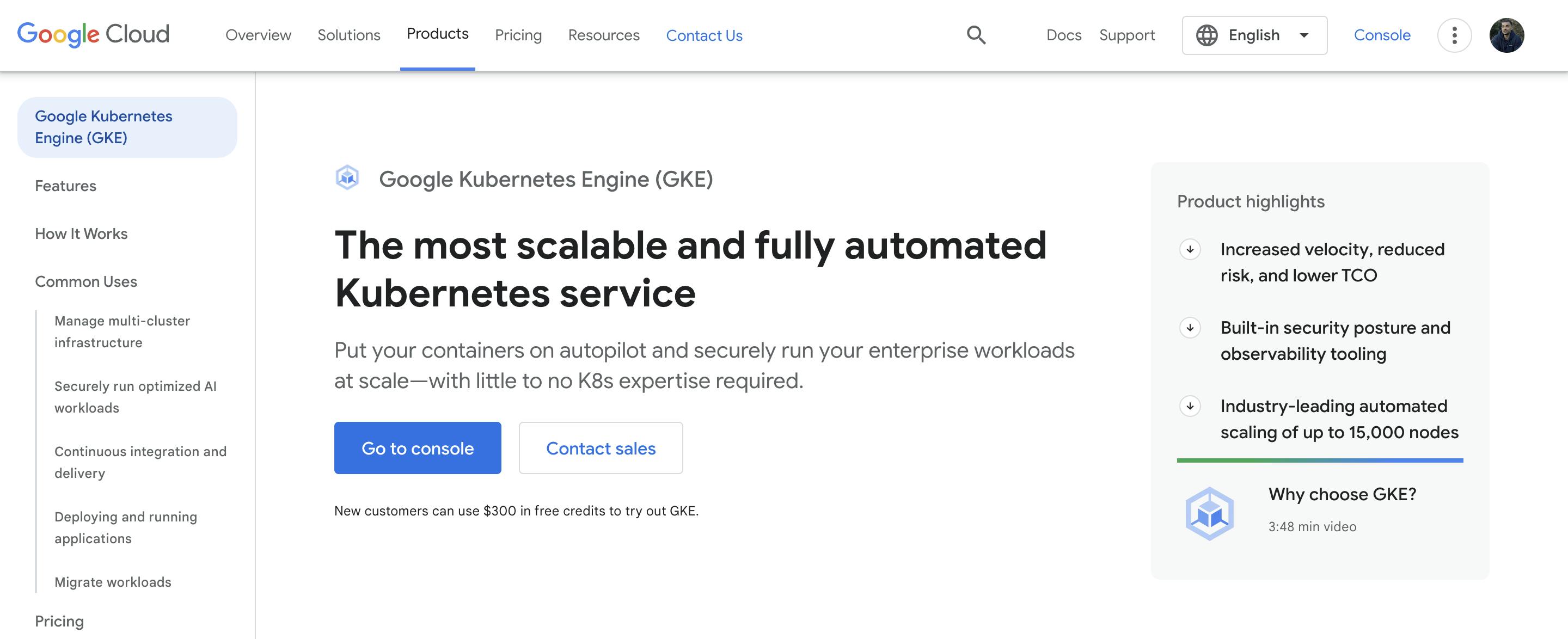
Pros:
- Advanced Cluster Management: GKE provides an easy-to-use interface for managing and scaling clusters
- Google Cloud Integration: Direct integration with Google's suite of cloud services offers enhanced performance and analytics capabilities.
- Ecosystem and Network: Access to Google’s cutting-edge technologies like BigQuery, AI, and machine learning services.
Cons:
- Learning Curve: Familiarity with Google Cloud Platform is required to fully leverage GKE’s capabilities.
- Google-Centric Tools: Some tools and services are proprietary, which might limit interoperability with non-Google environments.
Best suited for:
- GKE is a top choice for organizations seeking advanced cluster management and robust infrastructure. It is especially beneficial for applications that require strong data analytics, machine learning capabilities, and integration with Google’s cloud-native tools.
Recent advancements:
- Advanced threat detection features and simplified multi-cluster management.
#3. AKS (Azure Kubernetes Service)
Azure Kubernetes Service is Microsoft's managed Kubernetes service that simplifies the deployment, management, and scaling of Kubernetes on Azure. AKS offers integrated developer tools and DevOps experiences, making it a strong contender for enterprises already invested in the Microsoft ecosystem.

Pros:
- Azure Integration: Seamless integration with Azure services like Azure Active Directory and Azure DevOps enhances productivity and collaboration.
- Security and Compliance: Strong security features, including Azure’s security and identity services, which are crucial for enterprises.
- Developer Tools: AKS integrates with a range of Azure developer tools, making it easier for development teams to deploy and manage applications.
Cons:
- Complexity for Non-Azure Users: Users not familiar with Azure may find it challenging to navigate and utilize all features of AKS.
- Integration Limitations: While AKS integrates well within the Azure ecosystem, it may have limitations when used in conjunction with other cloud services.
Best Suited For:
- Best for enterprises already using Microsoft Azure cloud services, seeking to integrate Kubernetes with Azure’s developer tools and services. It is particularly suitable for scenarios requiring strong security, compliance standards, and seamless integration with other Azure services.
Recent advancements
- Enhanced Azure Monitor integration, automated scaling options.
#4. OpenShift (Red Hat)
Red Hat OpenShift is an enterprise Kubernetes platform. It offers automated installation, upgrades, and lifecycle management throughout the container stack—the operating system, Kubernetes, and cluster services.
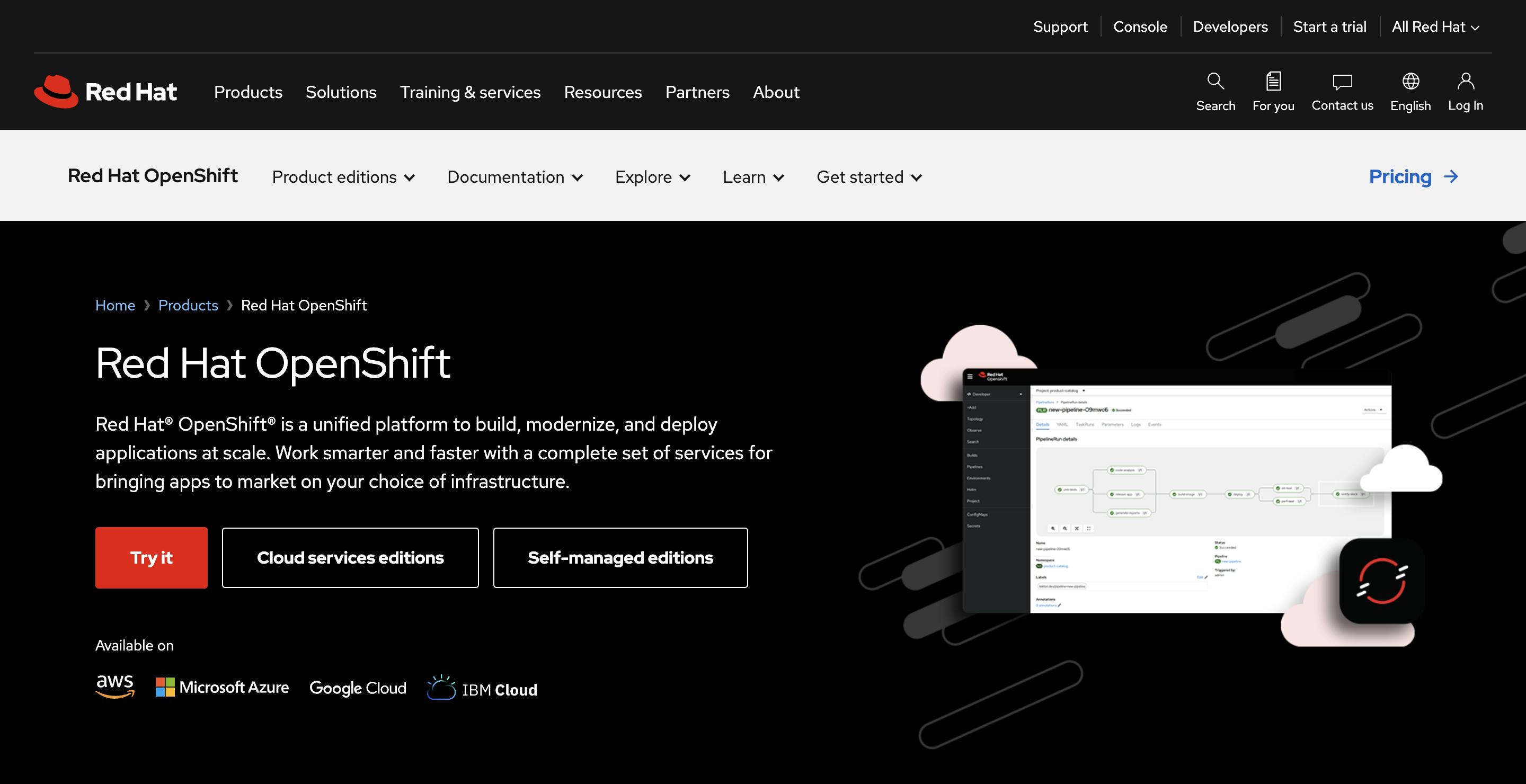
Pros:
- Comprehensive platform: Integrates with a broad range of hardware, software, and cloud providers.
- Developer-Friendly: Streamlines application development, deployment, and lifecycle management.
Cons:
- Complexity: Can be overwhelming for users new to container orchestration.
- Cost: Potentially higher cost, depending on the deployment model.
Best suited for:
- Organizations seeking a robust, enterprise-grade Kubernetes solution with strong support and a rich ecosystem.
Recent advancements:
- Enhanced developer tools, advanced cluster management capabilities, and expanded hybrid cloud support.
#B. Container as a Service (CaaS)
Container as a Service (CaaS) is a cloud-based service model that allows users to manage and deploy containers, applications, and clusters through a container-based virtualization layer. CaaS is often used in conjunction with Kubernetes, which orchestrates and automates the deployment, scaling, and operation of these containers.
Comparatively, managed Kubernetes services are a subset of CaaS where the provider not only offers Kubernetes as the orchestration layer but also manages it. In managed Kubernetes, the service provider handles the Kubernetes environment's setup, scaling, and maintenance. The key difference lies in the level of management and control. CaaS offers tools and services for container orchestration, but users are still responsible for managing the orchestration layer itself. Managed Kubernetes services, on the other hand, take over the orchestration layer management, giving users a more hands-off approach to Kubernetes. This makes managed Kubernetes ideal for those who want to leverage Kubernetes' capabilities without delving into its complexities, while CaaS is suitable for users who want more control over their container and orchestration environments. Now that we understand the difference, let’s go through the main players in this category.
#5. VMWare Tanzu
VMWare Tanzu is an enterprise-focused solution that extends Kubernetes' capabilities. It provides robust management tools for container orchestration, allowing businesses to run and manage their containerized applications effectively across different cloud environments.
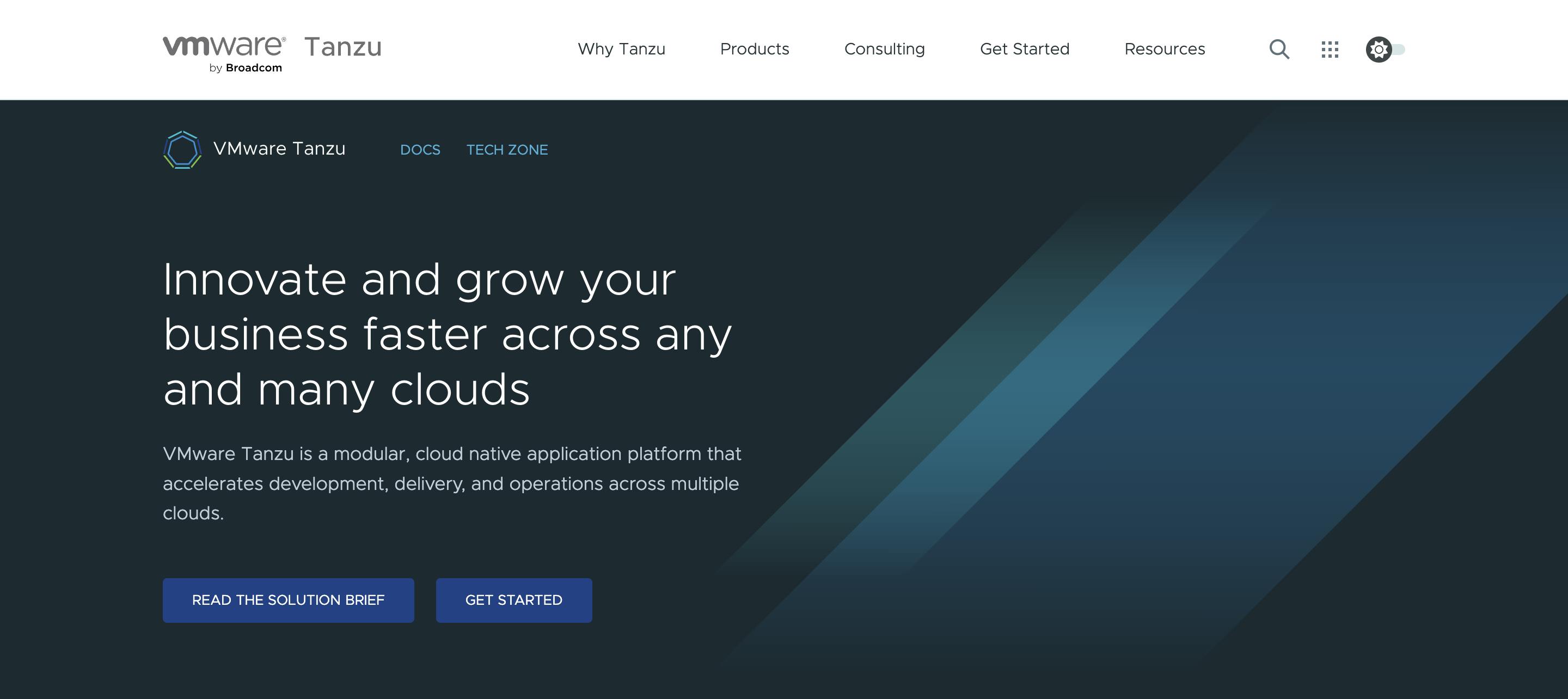
Pros:
- Enterprise-Focused: Tailored to meet the needs of large-scale businesses.
- Robust Management Tools: Offers a suite of tools for efficient management and orchestration of containers.
Cons:
- Potential High Cost: Might be expensive for smaller businesses or startups.
- Steep Learning Curve for Newcomers: New users might find it challenging to navigate and utilize all its features effectively.
Best suited for:
- VMWare Tanzu is ideal for large enterprises that require advanced Kubernetes solutions and have the resources to invest in comprehensive container management tools. It's particularly beneficial for organizations looking to leverage Kubernetes across hybrid or multi-cloud environments.
Recent advancements:
- Multi-cloud support, and integration with VMware's cloud management tools.
#C. Platform as a Service (PaaS)
Platform as a Service (PaaS) concerning Kubernetes provides a more comprehensive and developer-centric environment than Managed Kubernetes or Container as a Service (CaaS). While Managed Kubernetes focuses on simplifying the operational aspects of Kubernetes clusters and CaaS offers container orchestration, PaaS with Kubernetes extends further by offering a complete platform for building, deploying, and managing applications. This includes not only the orchestration and management of containers but also development tools, middleware, and databases integrated into the platform. PaaS abstracts much of the infrastructure management away, allowing developers to focus more on application development without worrying about underlying container orchestration or infrastructure details. Below are some of the key vendors in this category.
#6. Qovery
Qovery is a PaaS that blends the simplicity of Heroku with the power of Kubernetes. It allows developers to quickly deploy their applications on AWS, Google Cloud, or other cloud platforms without deep cloud or Kubernetes expertise.
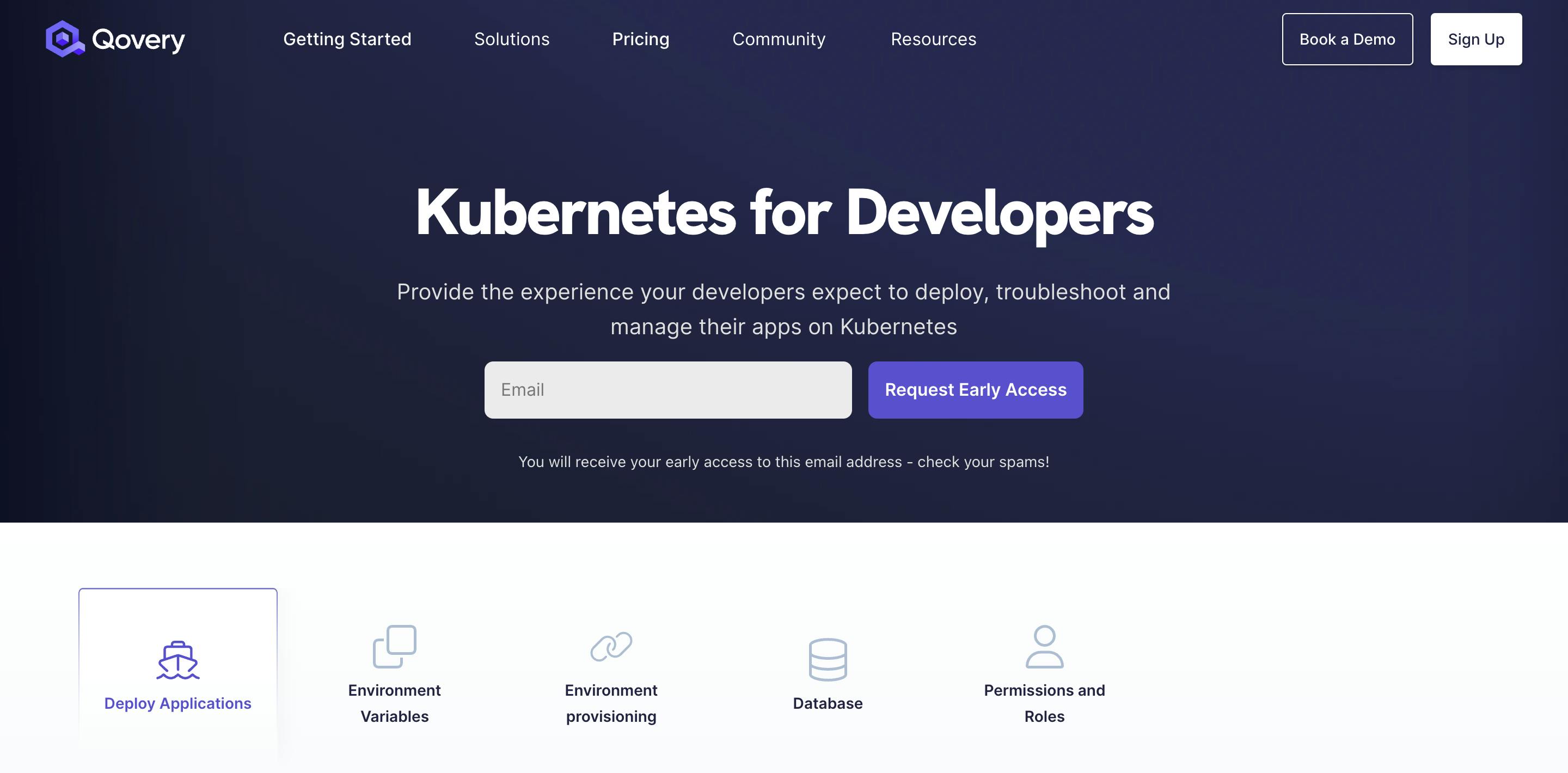
Pros:
- Easy to Use: Provides a straightforward interface for app deployment.
- Seamless Integration: Integrates easily with popular development tools and platforms.
Cons:
- Customization Limitations: While the platform provides great flexibility and covers most use cases, customization limitations may exist on very specific requirements linked to the deployment process or infrastructure configuration.
Best suited for:
- Qovery is well-suited for development teams that want to build their applications without worrying about the underlying infrastructure, especially for those leveraging cloud services like Amazon AWS or Google Cloud.
Recent advancements:
- Automated deployment pipelines, simplified configuration management, pre-built application deployments, automated cloud resource provisioning, simplified cloud resource management, and cost optimization.
#7. Rancher
Rancher is a complete software stack for teams adopting containers. It addresses the operational and security challenges of managing multiple Kubernetes clusters while providing DevOps teams with integrated tools for running containerized workloads.
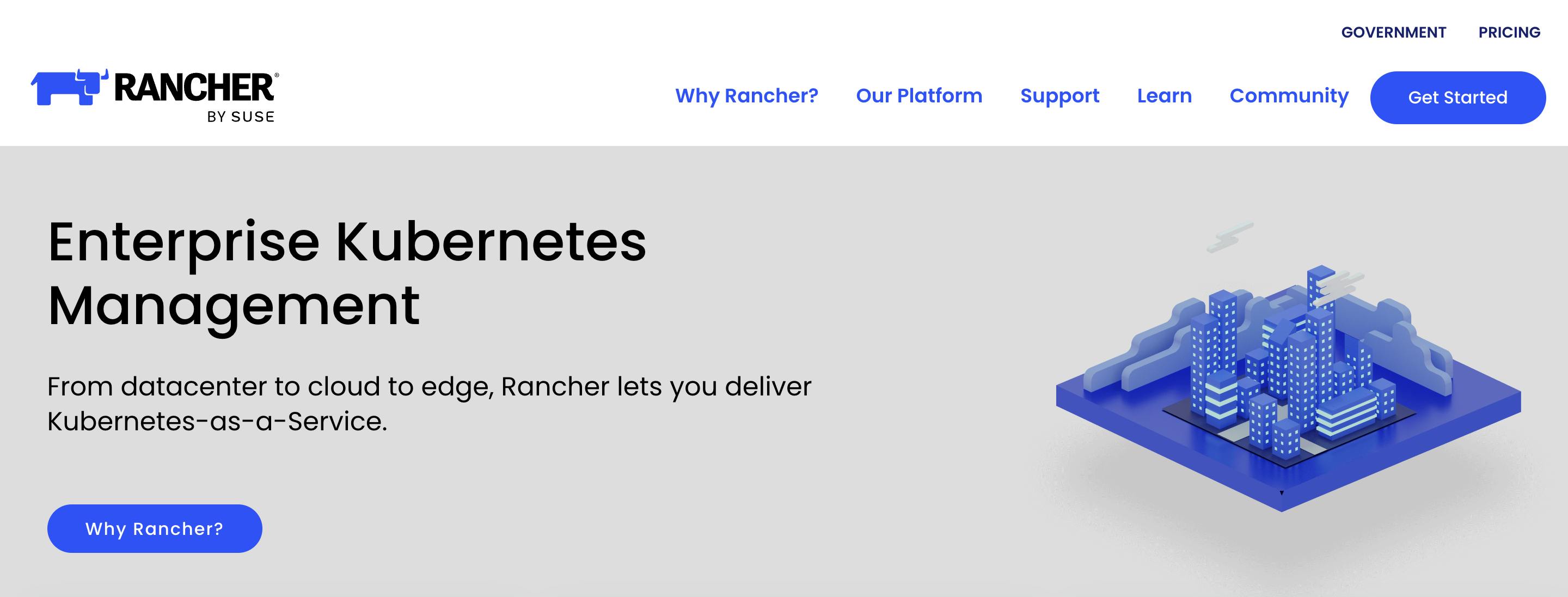
Pros:
- User-friendly: Rancher simplifies Kubernetes management, making it more accessible.
- Extensive Community Support: Offers strong community support and resources.
Cons:
- Integration Complexities: Integrating with existing systems can be tricky.
- Resource Demands: Requires adequate resources for optimal performance.
Best suited for:
Ideal for organizations seeking a comprehensive container orchestration platform that simplifies the management of Kubernetes across any infrastructure.
Recent advancements:
Policy-driven automation, centralized cluster management, and enhanced security features.
#D. Container Orchestration
#8. Nomad (by Hashicorp)
While Nomad is not a direct alternative to Kubernetes, it is a significant player in the container orchestration space. Nomad is a simpler and more flexible orchestrator designed to handle both containerized and non-containerized workloads.
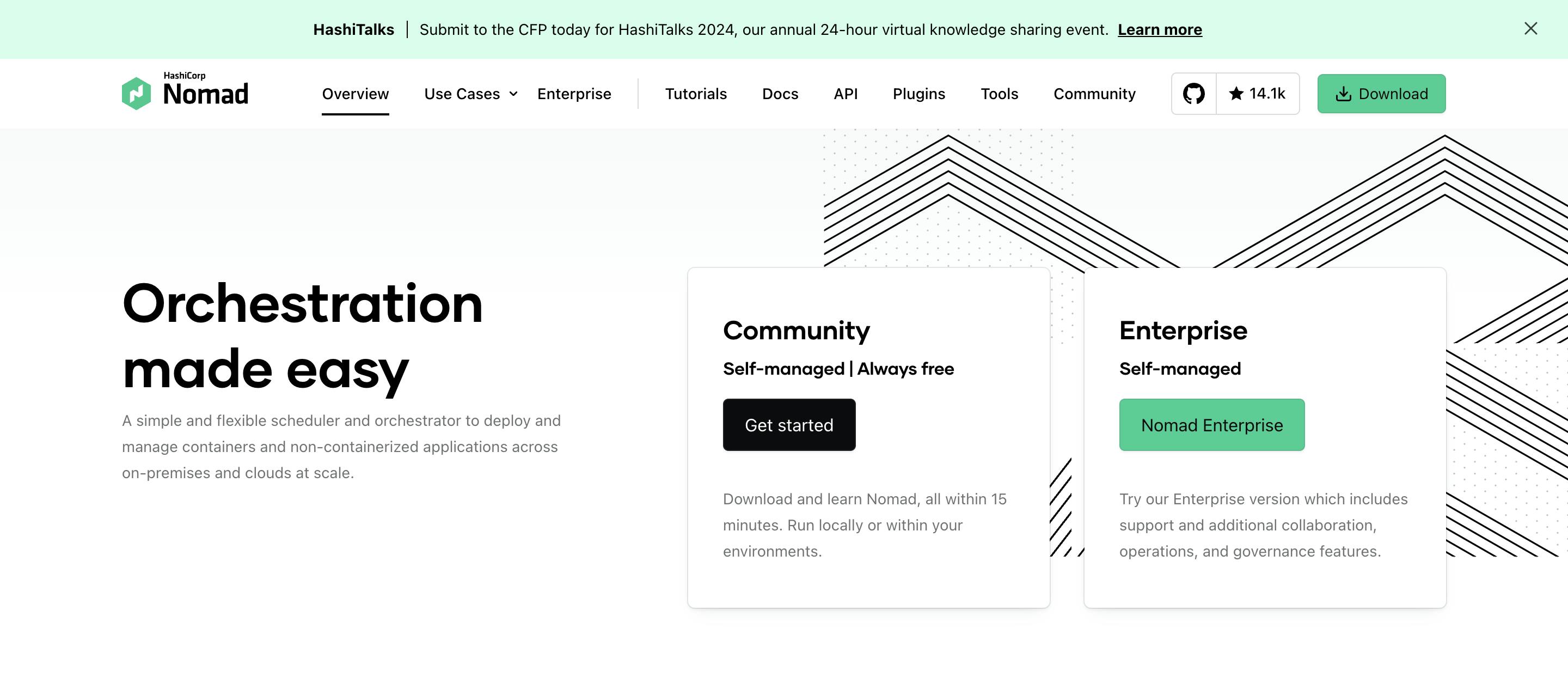
Pros:
- Simplicity: Easier to set up and operate than Kubernetes.
- Flexibility: Handles a wide range of workloads and can schedule containers, virtual machines, and standalone applications.
Cons:
- Ecosystem is not mature yet: Does not have as large an ecosystem or community as Kubernetes.
- Limited feature set: May not have all the advanced features and integrations available in Kubernetes.
Best suited for:
- Organizations looking for a lightweight and flexible orchestrator, especially those that need to manage a mix of containerized and non-containerized workloads.
Recent advancements:
- Continuous improvements in ease of use, scalability, and integration with HashiCorp’s other tools like Terraform and Vault.
#Comparative analysis of Kubernetes alternatives
#Comparison table of all the alternatives
Here is a table comparing all the notable vendors discussed in this article.

#Use Cases and Suitability
- Use Managed Kubernetes like EKS, GKE, or AKS if: You need deep cloud integration, extensive scalability, and are comfortable with some complexity or have already invested in a particular cloud platform.
- Use CaaS like VMWare Tanzu if: Your enterprise requires robust management tools for Kubernetes and can afford potentially higher costs.
- Use PaaS like Qovery or Rancher if: You prefer a more simplified approach to Kubernetes management or need to quickly deploy applications without deep involvement in container orchestration complexities.
#Conclusion
Kubernetes is a powerful platform, but it is complex to set up and manage. The complexity of Kubernetes inspired the development of new platforms that offer simplified deployment and management while still providing powerful orchestration capabilities. In this article, we have discussed all the notable Kubernetes competitors, whether they belong to the categories of PaaS, CaaS, or managed Kubernetes. There is no doubt that the world is gradually moving away from self-managing Kubernetes clusters, and that is why different options, like PaaS, CaaS, etc., are being adopted widely. Whether it's the cloud integration and scalability of managed services like EKS, GKE, and AKS, the enterprise-level capabilities of VMWare Tanzu in CaaS, or the user-friendly approaches of Rancher and Qovery in PaaS, each platform has its unique strengths. Your decision should align with your organizational needs, technical capabilities, and the specific demands of your applications. Adopt exploring and experimenting with these platforms to find your ideal container orchestration solution.
Your Favorite DevOps Automation Platform
Qovery is a DevOps Automation Platform Helping 200+ Organizations To Ship Faster and Eliminate DevOps Hiring Needs
Try it out now!

Your Favorite DevOps Automation Platform
Qovery is a DevOps Automation Platform Helping 200+ Organizations To Ship Faster and Eliminate DevOps Hiring Needs
Try it out now!
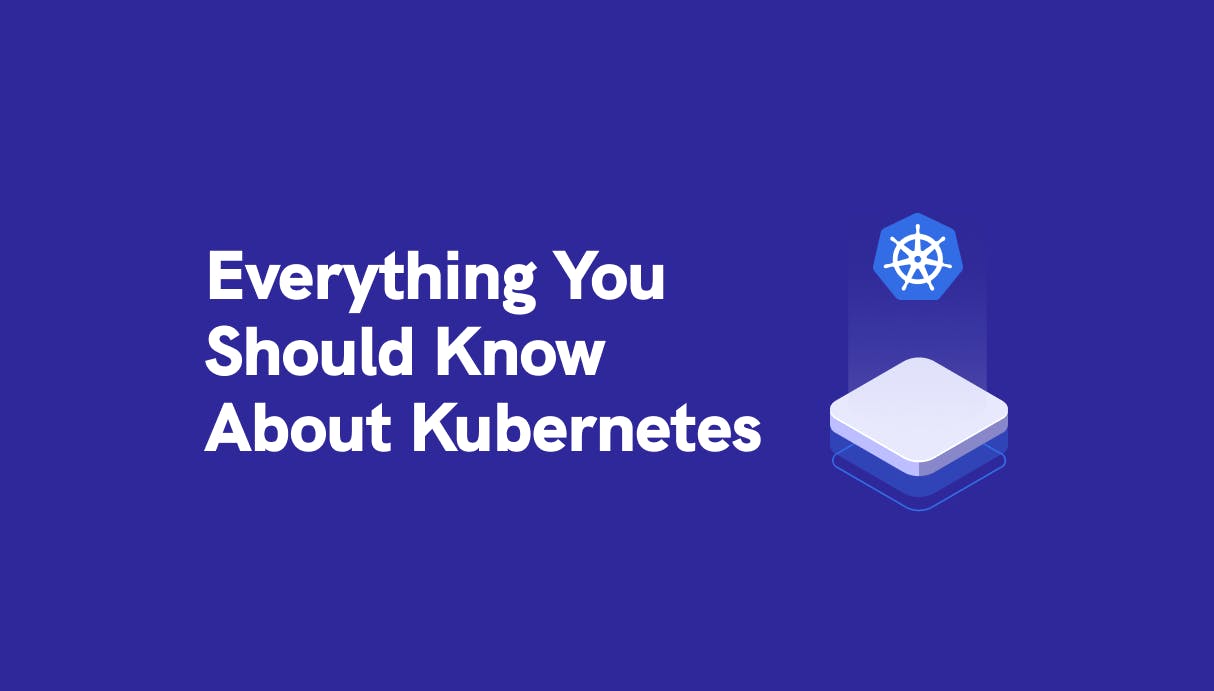
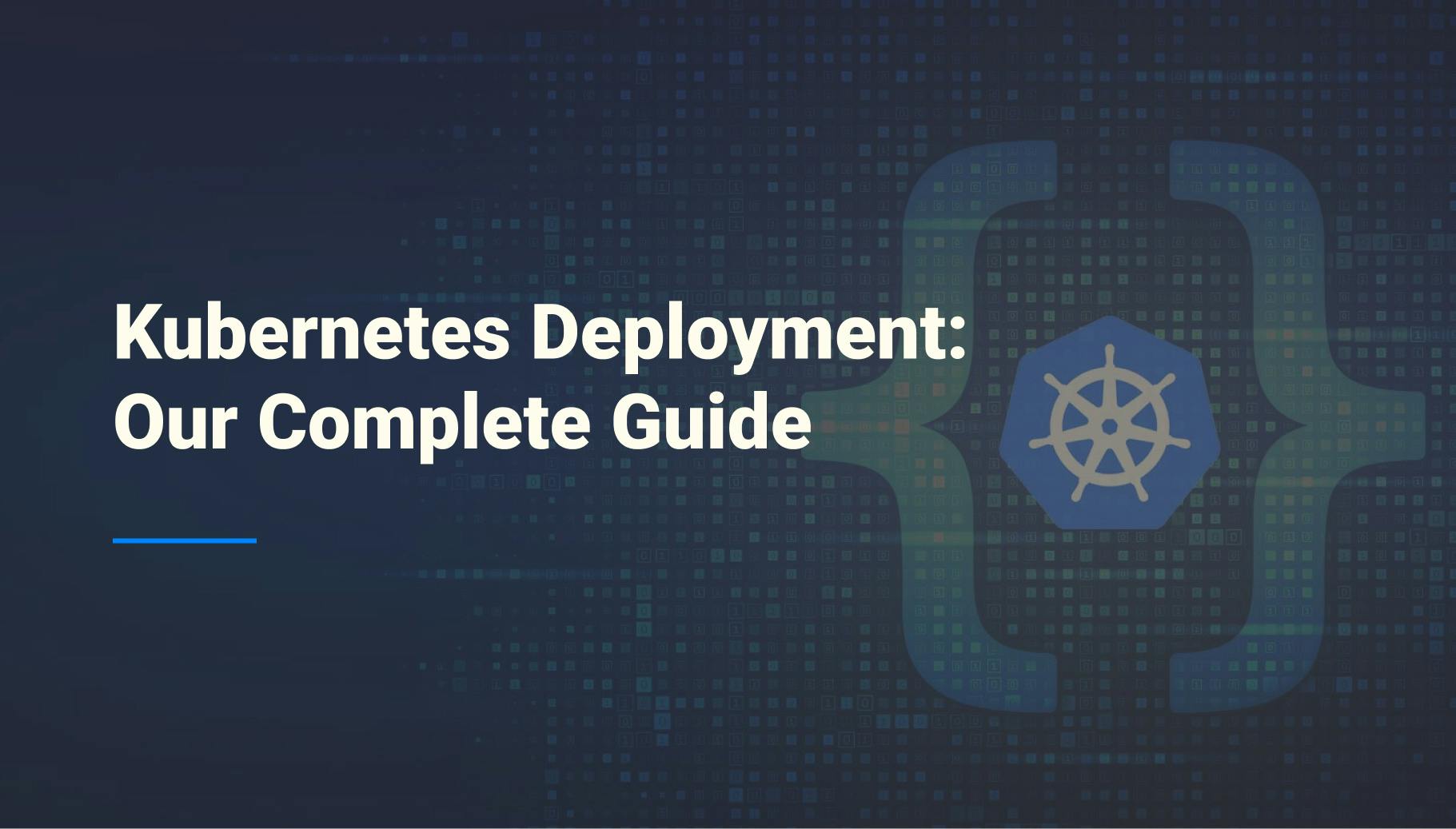
.jpg?ixlib=gatsbyFP&auto=compress%2Cformat&fit=max)